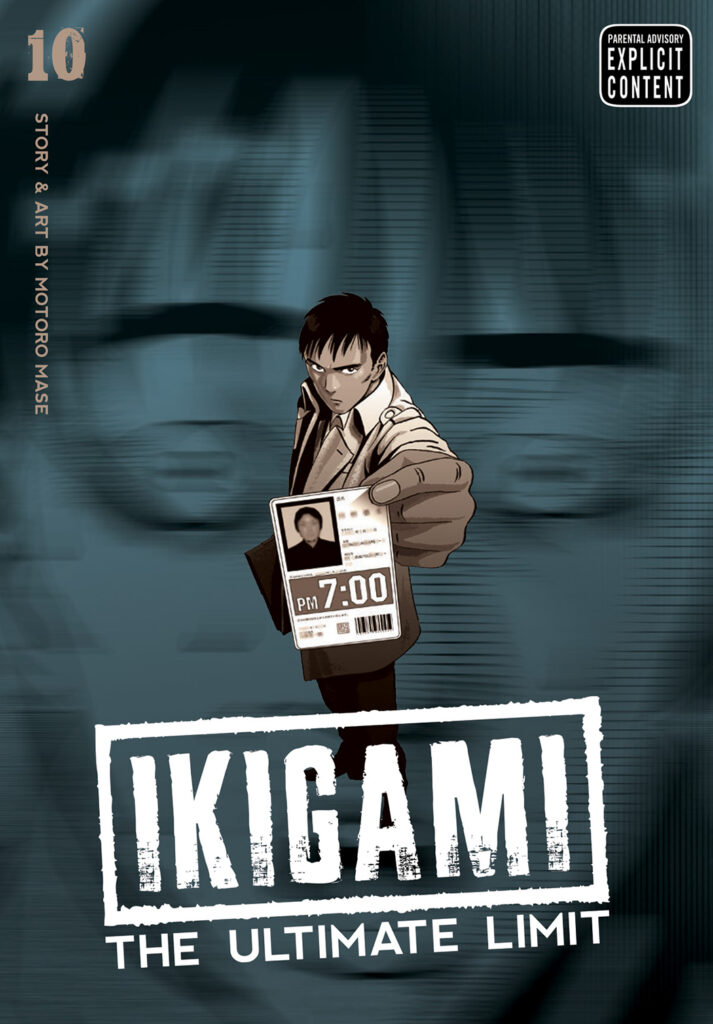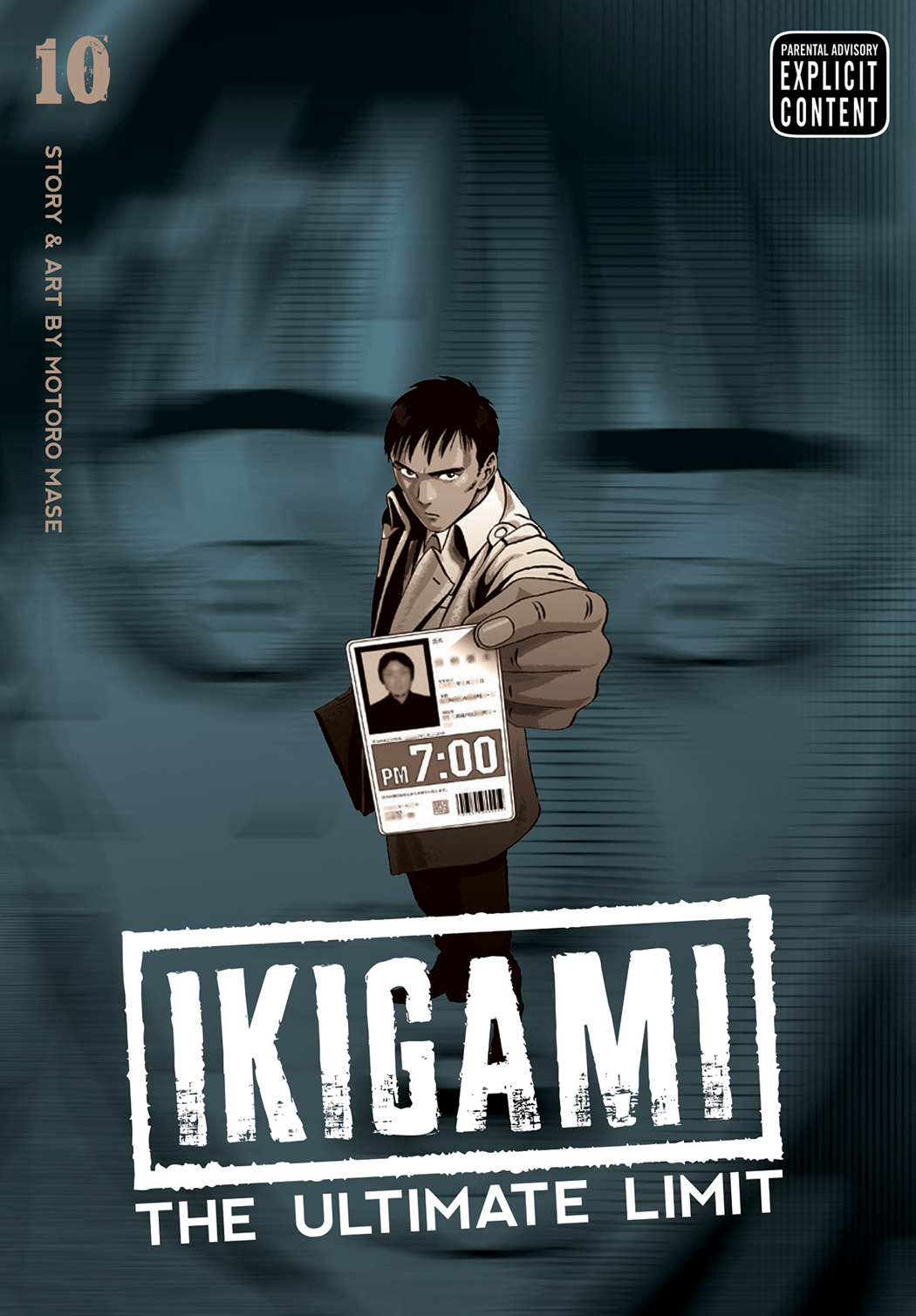Manga Review: Ikigami the Ultimate Limit Volume 10 by Motoro Mase
Quick recap: Thanks to the National Welfare Act, every child in the country is given their vaccinations when they come of grade school age. One in one thousand of these vaccinations also contains a nanocapsule that migrates to the heart, where it lodges. Some time between ages 18 and 24, the capsule will stop the heart, killing the person it’s in. Only a closely guarded government database has the information about who will die when, and they have a special bureaucracy set up to tell the victim 24 hours before the capsule is scheduled to go off.
In previous volumes, we’ve been following junior bureaucrat Kengo Fujimoto and the stories of those he gives their death notices, the Ikigami. Now the series approaches its own ultimate limit.

Each multi-part story is an “episode”, much like a dramatic television story, and this series could easily be done live-action (there was in fact a movie adaptation.)
“Episode 19: Entrusted Words” focuses on Mamoru Nakagami, a member of the National Welfare Police, basically a riot cop. At first, when he joined the police, he was rather timid, but in the last few months he’s lost his sense of fear and become more willing to use force. Waay more willing to use force, and prone to violent mood swings. It’s gotten to the point that he might be a little too brutal even by riot cops standards.
Nakagami wrote this off to “bad blood” inherited from his abusive father, and has become estranged from his mother. Recently, he learned there may be another cause.
During a police action, Nakagami meets an envoy from a “friendly nation” that’s studying the National Welfare program to see if it would be right for their nation. She lost a child under heartbreaking circumstances, and when she also witnesses Nakagami being given his ikigami, tries to dictate his final actions.
Nakagami’s argument with the envoy about the proper thing to do, and living with survivor’s guilt, is the centerpiece of this episode.
It also has the first of a set of major reveals, which is so central to my feelings about this series that I’m going to be discussing it in the SPOILERS section below.
Towards the end of the episode, Fujimoto is arrested as a “social miscreant” for a small act of defiance.
“Episode 20: The Phantom Country” picks up several months later with Fujimoto being released from the Thought Reform Center where he learned to love Big Brother the National Welfare. He’s a broken man, but is now ready to serve in whatever capacity his beloved country wants him to.
As it happens, they want him to spy on another former thought criminal, his old friend Nanase Kubo. The government suspects that her conditioning may have worn off, and that she’s working with an underground group of dissenters. That could be especially bad for the country as its ally is now at war and many citizens have become combat support troops.
In the process, however, Fujimoto is subjected to several more major reveals, which shake his faith in the National Welfare. Will he be able to pull together and fulfill his mission, or fall apart at the last moment?
The series has good, detailed art (some same face), and most of the episodes have been interesting dramas in themselves. “What would you do if you knew you were dying in 24 hours?” is a solid question for creating stories. But since the story is ending, the overall premise needed to create these stories has to be resolved in some way. While the ending is still well-written, it’s not as strong as the earlier, self-contained episodes.
Content note: Police brutality, domestic violence, workplace bullying, child death, implied torture. This series is rated for “mature” viewers.
I’d recommend this series primarily to people intrigued by the central question and willing to put up with the elaborate background necessary to bring it up.
SPOILERS–proceed beyond this point at your own risk.
TV Tropes calls it a “Tomato Surprise”–some basic fact about the story’s setting or characters has been withheld from the readers until a suitably dramatic moment. Sometimes it’s something even the viewpoint character doesn’t know about themselves, “tomato in the mirror” as they discover they’ve been a tomato all along, but often it’s already known to the characters and they just never got around to mentioning it.
In this case it’s the latter. Despite all the characters looking Japanese, speaking Japanese and having Japanese names, and the culture being basically modern Japan with dystopian elements bolted on–the country we’ve been watching this entire time is not alternate history Japan. Japan is a completely separate country, which the “friendly” envoy is from, and the country’s “ally” is not the United States.
And looking back through the volumes, we can see that the author never actually said the country was Japan. We’ve never seen the country’s flag or had any real city’s name mentioned. It’s always been “this nation” or “our ally.” And it shares just enough history with Japan to be misleading.
How do I feel about the twist? Mixed. As a conceptual twist, it’s excellent. It completely blindsided me and was well executed.
On the other hand, I feel it undercuts the social satire aspect of the premise. The alternate Earth’s Japan is exactly like our own, and is described as “respecting the value of life” so doesn’t need the National Welfare Act. Instead of the story being, “this could be us on a slightly different path”, it’s “this is something we should not do.”
It would be like a story in which a typical, seemingly American small city slowly falls under the control of a fascist group under the guise of patriotism, and despite all the characters having American-sounding names, American accents, and typical American habits and viewpoints, in the next to last chapter, we find out this is an entirely separate country, and “real Americans would never fall for this shit.”
By comparison, the big twists revealing the true purpose of the National Welfare Act pale. Sure, they are in-universe earth-shattering, but the set-up smelled suspicious from the beginning, so we were expecting the truth to be sinister.
So I cannot recommend this series as whole-heartedly as I would like. The pieces are still fine, but the superstructure is weakened.
END SPOILERS

